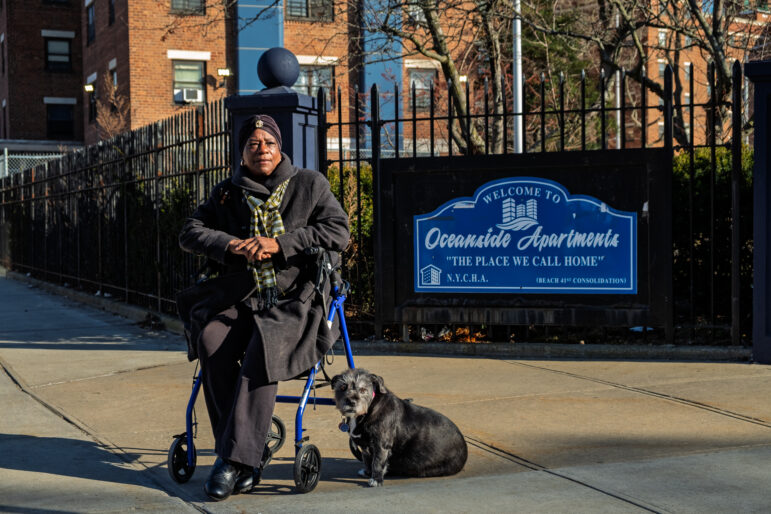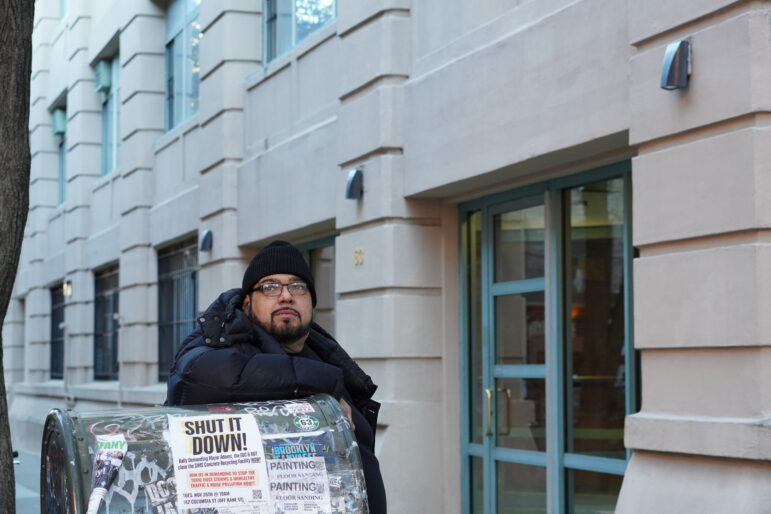“Black New Yorkers are disproportionately affected by homelessness, making up 58 percent of shelter residents; 80 percent of the workers caring for these individuals are women of color, yet the top ranks of the organizations that employ them and set organizational policies are overwhelmingly white.”

Adi Talwar
A bedroom in a supportive housing complex in Harlem. CityViews are readers’ opinions, not those of City Limits. Add your voice today!
CityViews are readers’ opinions, not those of City Limits. Add your voice today!
Dedicate each day to providing care and services to your neighbors, and an undeniable truth emerges—shared experiences, between frontline staff and those they work to support, foster improved outcomes for all. Studies show these impacts across sectors, including healthcare, mental health counseling, education, and the legal system.
This also holds true in supportive housing, which helps formerly homeless New Yorkers get back on their feet with permanent housing and support services provided by a wide array of professionals—from case managers and program directors to life skills coaches and more. This system, pioneered in New York and proven to work, is fundamentally based on human interaction and the creation of trust over the long term. We must center these relationships in our continuum of care.
That means looking beyond the investment into brick-and-mortar buildings and considering the human infrastructure of our sector, which is facing a severe labor shortage in the face of growing demand. A good place to start is by ensuring that members of its primarily Black and brown direct service workforce have advancement opportunities.
The current lopsided structure shows how much work there is to do. Individuals of color account for close to 90 percent of New York City’s homeless population and Black New Yorkers are disproportionately affected by homelessness, making up 58 percent of shelter residents. Eighty percent of the workers caring for these individuals are women of color, yet the top ranks of the organizations that employ them and set organizational policies are overwhelmingly white.
It is time for that to change. The good news is that promising work is already underway in the community that is making a real difference. The better news is that it is easily scalable across the sector.
In 2020, Black leaders at half a dozen city nonprofits formed Racial Equity in Supportive Housing (RESH) to address the lack of diversity at the upper echelons of the supportive housing sector, and created the Readying Emerging Leaders in Supportive Housing (RELISH) Program. RELISH is a peer mentorship program designed to provide emerging Black leaders with the management, leadership, and networking skills necessary for upward mobility in supportive housing. Every participant is sponsored by their employer. All benefit.
It was long overdue. The benefits of mentoring are well documented: workplaces with mentorship programs experience improved productivity and satisfaction, increased compensation, and workforce diversity. In fact, one case study found that employees who participated in mentoring were 49 percent less likely to leave their jobs. But more than half of Black Americans say they have never had a mentor, and the challenges are even more acute for Black women.
That is where RELISH comes in. The curriculum offers essential skills that are not easily attained without mentorship—things like how to navigate board politics, raise capital, or supervise employees. Our mentor/mentee relationship is proof that the system works: we were paired in last year’s cohort and continue to speak regularly. Our dynamic is illustrative in another way: Chandra, the mentor, is based in Buffalo, while Chinetta, the mentee, works in New York City. This demonstrates how the challenges faced by Black women in the housing field transcend regional boundaries.
Our relationship, and RELISH writ large, bore fruit: Chinetta was promoted to assistant vice president after completing the program. And she is not alone: five additional 2022 graduating scholars were promoted post-RELISH with significant raises, helping address a gender pay gap that is even more persistent among Black women.
This year’s program—which grew by 10 percent and includes a wider range of participating mentors and mentees—celebrated its graduation in mid-December. More success stories like ours will surely soon follow.
The early success and growing popularity of RELISH demonstrates the acute need for programs that support and nurture the next generation of Black nonprofit leaders in housing and homelessness services. Our cultural astuteness and unparalleled life experiences uniquely equip us to create responsive policies, projects, and programming for the clients we serve.
The unique RELISH program and those who make it possible have established a blueprint for dismantling long-standing inequities in the nonprofit homelessness and housing sectors while also paving the foundation to solve the human services labor shortage, which threatens to undermine an already strained and chronically underfunded system.
Now we need more supporters and participants to follow their lead. If we work together, we can finally create the truly equitable and sustainable system vulnerable New Yorkers—and the selfless, motivated individuals who work to improve their lives—need and deserve.
Chinetta Mitchell is assistant vice president of supportive housing at Lantern Community Services; Chandra Redfern is chief executive officer of the Buffalo Federation of Neighborhood Centers Inc.







